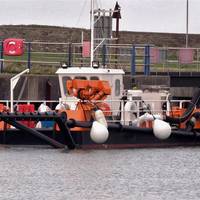The Marine Group Grows Its Dredging Fleet

The Marine Group’s Harbor Management Division has expanded its dredging capabilities with the recent completion of its bespoke built water injection dredger CMS Seaka. Following the deployment of CMS Innovation, The Marine Group invested in the development of a more powerful and highly efficient machine that adopts the same environmentally friendly water injection technology.The Marine Group purchased CMS Seaka as a Multicat in 2018. The vessel was then comprehensively redesigned by OSD-IMT and modified by the original builders…
Feature: Queen Mary 2 New Technology Melded to the North Atlantic Tradition
Confounding the skeptics who said the 70,300-gt Queen Elizabeth 2 would be the last transatlantic liner ever built, the 150,000-gt Queen Mary 2 is set to make her service debut in January 2004, signifying a $780-million investment in a luxury passenger ship structurally engineered for the North Atlantic. Destined to uphold and revitalize the Cunard liner tradition, the 30-knot QM2 will break new ground in passenger ship technology, while incorporating lessons learned with the 1969-commissioned QE2. The challenge of fulfilling an extremely tough schedule in a notoriously harsh environment, and of meeting rising customer expectations as to service quality, comfort and reliability in all conditions, permeates every aspect of the technical design.
Carnival, Wärtsilä Clearing The Air
As the world's cruise lines grow exponentially larger and are increasingly falling under the gaze of environmental and regulatory bodies, the push to ensure that ships are run safely, efficiently and environmentally sound gains new importance each day. The world's largest cruise ship company - Carnival Corporation (CCL) - has hooked up with one of the premier builders of marine diesel engines - Wärtsilä NSD - to develop a smokeless diesel-electric propulsion system for cruise ships. Code-named "project enviroengine," prototypes of the new engine are expected to be available later this year for laboratory testing and are expected to be available commercially in 2001. Following successful completion of testing, Carnival plans to utilize those engines on its future newbuilds.
Offshore India Heats Up
U.S.-based Hardy Exploration and Production (India) Inc. has revived a declining oil field off India's southern coast and increased its output by over 2,000 bpd. Hardy Exploration's chief executive, Sastry Karra, said his company drilled India's deepest horizontal well of about 1,200 m to revive the PY-3 field and step up its output to 5,600 bpd from 3,600 bpd. "This lateral well flowing a light crude of 49 API and another one we are starting to drill today should extend the life of the PY-3 field by several years at least," Karra said. In April, Karra told Reuters the firm was likely to spend about $16 million for drilling two new lateral wells and using water injection technology to extend the life of the declining field -- then producing 4,000 bpd -- by another five years.
Wärtsilä Wins Environmental Award
Det Norske Veritas granted Wärtsilä's Finnish companies, Wärtsilä Finland Oy and Wärtsilä Technology Oy, ISO 14001 environmental certification in recognition of the functionality of Wärtsilä's environmental management system. Wärtsilä's ISO 14001 environmental management system covers all the company's operations: sales, manufacturing, R&D and service. ISO 14001 is an international environmental standard highly respected by the customers. A product range that addresses environmental issues offers a clear competitive advantage in the marine and power plant markets. Wärtsilä's engines meet all current environmental requirements and Wärtsilä's goal is to exploit new technologies to achieve further reductions in emission levels.
Carnival, Wärtsilä Clearing The Air
As the world’s cruise lines grow exponentially larger and are increasingly falling under the gaze of environmental and regulatory bodies, the push to ensure that ships are run safely, efficiently and environmentally sound gains new importance each day. The world’s largest cruise ship company -- Carnival Corporation (CCL) -- has hooked up with one of the premier builders of marine diesel engines -- Wärtsilä NSD -- to develop a smokeless diesel-electric propulsion system for cruise ships. Code-named "project enviroengine," prototypes of the new engine are expected to be available later this year for laboratory testing and are expected to be available commercially in 2001. Following successful completion of testing, Carnival plans to utilize those engines on its future newbuilds.
A broader-based payback from R&D
Consolidation in the diesel engine building sector is partly a reflection of the substantial capital expenditure required to maintain product development and technological advance in a business characterized by comparatively low unit margins. By spinning-off new technical solutions arising from the engine design program into upgrading and conversion packages for existing populations of machinery, the manufacturer and licensor can gain more from R&D endeavors. Complementing new engine sales, product releases aimed at plant already in operation represents another stream of payback on heavy investment in technology. The companion effect of the strategy…







